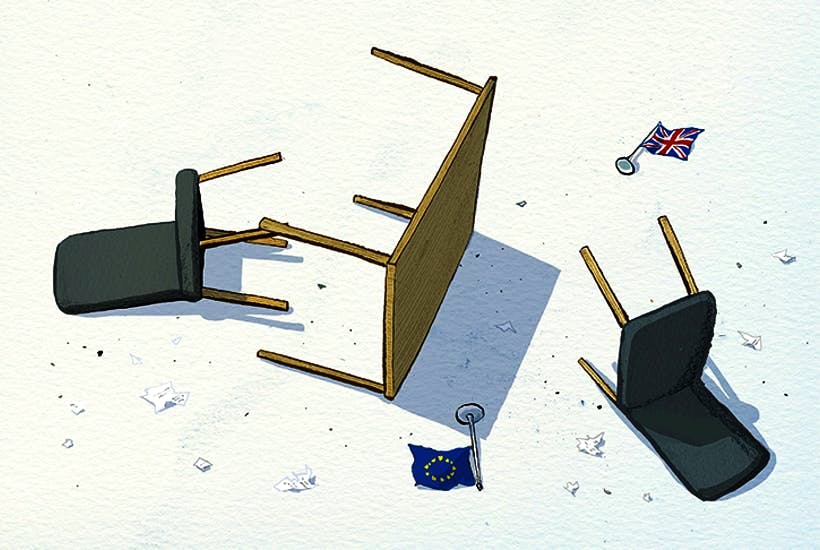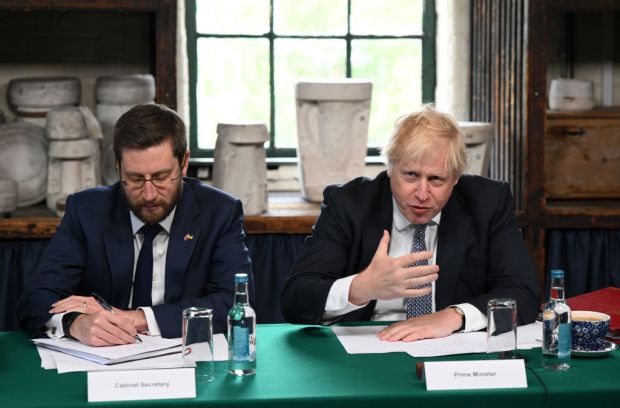I’ve been passed the government’s ‘reasonable worst case scenario planning assumptions to support civil contingencies planning for the end of the transition period’. The 34-page document describes itself as a ‘challenging manifestation of the risk in question’ but ‘not an extreme or absolute worst case scenario’.
A government source confirmed the official sensitive document, which was written in September, still underpins contingency planning. It is ‘not a forecast’ but a ‘reasonable’ assessment of what could happen to us if, in the next day or so, talks collapse on a free trade agreement with the European Union and the negotiations can’t be rescued.
Also, as Chancellor of the Duchy of Lancaster Michael Gove has conceded, too few businesses are prepared for the increased bureaucratic burden of trading with the EU even if there is a free trade agreement — so some of the ‘reasonable worst case’ shocks could materialise in any circumstances.
So what are those possible shocks? Well, these are the main headlines:
- Flow rates of medicines and medical products ‘could initially reduce to 60 to 80 per cent over three months which, if unmitigated, would impact on the supply of medicines and medical products across the UK’.
- ‘Protests and counter-protests will take place across the UK and may absorb significant amounts of police resources. There may also be a rise in public disorder and community tensions.’
- ‘EU and UK fishers could clash over the lost access to historic fishing grounds, and there could be a significant uplift in illegal fishing activities.’
- ‘Competing demands on UK government and devolved administration maritime agencies and their assets could put [maritime security] enforcement and response capabilities at risk.’
- There will be ‘reduced [food] supply availability, especially of certain fresh products’ and ‘supply of some critical dependencies for the food supply chain… could be reduced’.
- ‘Low income groups will be disproportionately affected by any price rises in food and fuel.’
- ‘Border delays, tariffs and new regulatory barriers/costs may result in disruption to supply of critical chemicals used in the UK… leading to the disruption of essential services (such as food, energy, water and medicine). Economic factors could result in some chemicals suppliers reducing operations or closing.’
- ‘Border delays could affect local fuel disruption. There will not be wider national-level oil shortage.’
- There is a risk of a reduction in the supply of medicines for UK veterinary use which ‘would reduce our ability to prevent and control disease outbreaks, with potential detrimental impacts for animal health and welfare, the environment, wider food safety/availability and zoonotic disease control which can directly impact human health’.
- ‘Between 40 and 70per cent of trucks travelling to the EU might not be ready for new border controls. This could reduce flow across the short channel crossing to 60 to 80 per cent of normal levels with maximum queues of 7,000 trucks in Kent and delays of two days. The worst disruption would subside within three months’.
- The transition from ‘internal security co-operation with the EU’ to ‘non-EU mechanisms’ may not be smooth and seamless and may ‘result in a mutual reduction in capability to tackle crime and terrorism’.
- Around one in 20 local authorities are at risk of financial collapse as a result of higher service demand caused by a disruptive EU exit.
There are plenty of other risks identified in the document. They show the magnitude of what is at stake as talks on that elusive free trade deal reach their climax.
I asked the government for a comment. This is what a spokesperson said:
As a responsible government we continue to make extensive preparations for a wide range of scenarios, including the reasonable worst case. This is not a forecast or prediction of what will happen but rather a stretching scenario. It reflects a responsible government ensuring we are ready for all eventualities.
Whatever the outcome of the negotiations, we will soon be outside the single market and customs union. It’s vital that businesses and citizens prepare now for the opportunities and changes at the end of the transition period, and intensive planning is underway to support them to get ready.
This includes launching a comprehensive communications campaign to make sure everyone knows what they need to do to prepare.
Got something to add? Join the discussion and comment below.
Get 10 issues for just $10
Subscribe to The Spectator Australia today for the next 10 magazine issues, plus full online access, for just $10.





















Comments
Don't miss out
Join the conversation with other Spectator Australia readers. Subscribe to leave a comment.
SUBSCRIBEAlready a subscriber? Log in